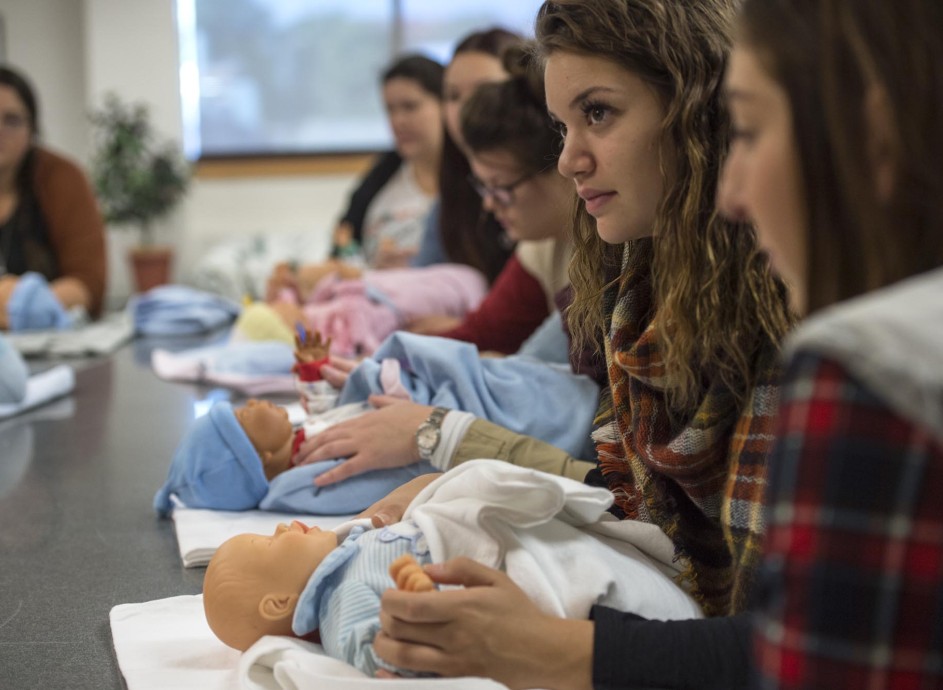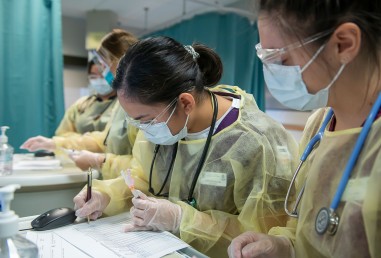
Program Overview
Program Details
Full Time Offerings
Full Time Offerings
Your Learning Experience
Students will develop the specialized knowledge, skills and experience to grow their ethical, culturally safe and client-centred doula practice.
You’ll begin by studying anatomy and physiology, as well as the emotional, physical and cultural aspects of pregnancy and birth required to provide families with information and support during pregnancy, childbirth newborn care, and loss. You’ll also be introduced to business management/entrepreneurship concepts and strategies, including business ethics, contracts, marketing and sales techniques and personal financial management.
The Doula Studies program also hosts a series of free, weekly community drop-in sessions for new and expectant parents. Guided by our expert faculty, the sessions are a great learning experience for our students to provide childbirth education, feeding support, infant care questions and more!
As unregulated health care professionals, a doula’s role involves advocacy, education, counselling, collaboration and negotiation to provide physical, emotional and informational support to individuals and families across the full spectrum of their reproductive choices.
Delivered over two 15-week terms, the Doula Studies program offers hands-on experience and an evidence-informed curriculum that emphasizes the dynamic role of the doula supporting people within a complex and multi-dimensional health care system and communities to prepare graduates for a rewarding career collaborating with health care teams.
For graduates interested in continuing their education in health care, Fanshawe's doula training provides students with the recommended year of post-secondary studies.
Career Information
Graduates of Fanshawe's Doula Studies program will have a strong foundation of evidence informed knowledge, reproductive justice, practical skills and valuable lab and field placements to prepare them for a rewarding career helping families across the full spectrum of their reproductive journey.
Most doulas are self-employed so graduates will be prepared to develop and manage their own business. Given the comprehensive nature of the program, graduates will be able to work as a full-spectrum doula, birth doula and a postpartum doula. Graduates will also be prepared to work in:
- clinics
- health units
- infant feeding clinics
- social service and community centres providing childbirth education workshops, postnatal care workshops, and loss support groups
Did you know Fanshawe consistently ranks high in graduation employment rates among large colleges in Ontario?
Here are some examples of career opportunities for graduates of Fanshawe’s Doula Studies program:
Self-Employment
Be your own boss by growing your own successful doula business.
Birth and Postpartum Doula
Provide support to families prenatally, during birth and the postpartum period.
End of Life Doula
Help a person navigate through the unfamiliar territory at the end of their life while helping family members and friends to care for their loved one.
Placements
The Doula Studies program provides placements for the students enrolled in the program in both fall and winter terms. If you are an agency interested in doula student placements or, if you are an individual interested in working with a doula student, please click on the link below and complete the form.
Learning Outcomes
- Assist with the delivery of family-centred maternity care in collaboration with members of the health care team.
- Examine the historical, political, and cultural aspects of the provision of maternity care both locally and globally and identify how they shape the experiences of contemporary mothering to meet the needs of clients.
- Apply knowledge of the anatomy and physiology of a woman during pregnancy, birth, and postpartum to address the concerns and needs of clients.
- Provide evidence-informed physical, emotional, physiological, and psychosexual support to enhance the comfort, health, and well-being of individuals and families as they negotiate the various transitions associated with pregnancy, birth, and postpartum.
- Provide families with community and online resources related to the childbearing years to empower clients to make evidence-informed choices regarding pregnancy and birth options and newborn care, including infant and newborn nutrition.
- Describe diagnostic testing procedures and medical interventions routinely used during pregnancy, labour, birth, and the postpartum period, and recognize the normal ranges and parameters for those test results.
- Identify early signs of maternal physical and mental health concerns, and refer clients to appropriate community resources in a timely manner.
- Foster professional relationships with clients, family members, caregivers, and other doulas.
- Establish and maintain a professional doula business in accordance with professional, legal, and ethical guidelines.
- Identify and support clients’ needs based on the theories of diverse social determinants of health, cultural humility, and intersectionality and the principle of harm reduction.
Academic School
Quality Assurance and Doula Studies Coordinator:
Karen Jenkins
Admission Requirements
OSSD (with courses from the College (C), University (U), University/College (M), or Open (O) stream), or equivalent, or mature applicant.
Students who do not have a high school diploma may wish to consider taking the Academic and Career Entrance (ACE) grade 12 Equivalency Certificate.
International Admission Equivalencies
English Language Requirements
English Language Requirements
| Test | Score |
|---|---|
| TOEFL iBT | 79 |
| IELTS Academic | Overall score of 6.0 with no score less than 5.5 in any of the four bands |
| CAEL | Overall score of 60 with no score less than 50 in any of the four bands. score of 80 in listening |
| PTE Academic | 53 |
| Cambridge English | Overall score of 169 with no language skill less than 162 |
| ESL4/GAP5 | Minimum grade of 80% in Level 8, 75% in Level 9, or 70% in Level 10 |
| Duolingo | Overall score of 105, with no score lower than 95 |
Recommended Academic Preparation
Recommended Academic Preparation
- Any Grade 12 English (C), (U), or (O)
- Grade 11 or Grade 12 Biology (C) or (U)
- Grade 11 Health Care (C) OR Grade 12 Human Development
Throughout the Lifespan (M)
Recommended Personal Preparation
Recommended Personal Preparation
- Knowledge of and interest in working with pregnant people, women, children and families across the full spectrum of reproductive options.
- Development of personal responsibility and emotional maturity by participating in social organizations interested in helping people using the principles of social justice and trauma informed care.
- Willingness to collaborate with others in the delivery of family-centred maternity care in collaboration with members of the health care team
- Show respect for the diverse opinions, values, belief systems, and contribution of others
- Ability to effectively communicate in conversational English
- Up to date immunizations and TB testing
Applicant Selection Criteria
Applicant Selection Criteria
Where the number of eligible applicants exceeds the available spaces in the program, the Applicant Selection Criteria will be:- Preference for Permanent Residents of Ontario
- Receipt of Application by February 1st (After this date, Fanshawe College will consider applicants on a first-come, first-served basis until the program is full)
- Achievement in the Admission Requirements
Post-Admission Requirements
Post-Admission Requirements
- Possession of a Standard First Aid course certificate (either St. John Ambulance or Canadian Red Cross or equivalent)
- Basic Rescuer course certificate - Basic Life Support (BLS) for Health Care Providers (HCP) in accordance with the Heart and Stroke Foundation of Canada Canadian Guidelines for CPR
- Evidence of Good Health
- Up to date immunizations are required
- Police Record Check and Vulnerable Sector Screening, including a check of the Pardoned Sexual Offenders Database
- Privacy and Confidentiality Agreement
- Travel to practicum placements and site visits at the student's own expense will be required
- Guide to Completing your Professional Practice Requirements
- Pre-Placement Process
- Professional Practice Health Form
- Placement Agreement
Courses
| Level 1 | ||||
| HLTH-1230 | Historical Context-Reproductive Culture | 3 | ||
This course introduces students to the historical, cultural and situational factors influencing reproduction locally and around the world. Students will examine from multiple perspectives the influences and consequences of the medicalization of birth on maternal and newborn outcomes. Course content will also critically reflect on the emergence of the professional doula and the regulation of midwifery care within North America. | ||||
| HLTH-1231 | Anatomy & Physiology of Reproduction | 3 | ||
This course introduces basic anatomical and physiological concepts related to reproduction. Topics will include embryology, anatomy, physiology, endocrinology, immunology and basic medical terminology. | ||||
| HLTH-1232 | Preparing for Birth 1 | 3 | ||
This course examines pregnancy and the process of labour and birth for the labouring person, partner and doula. Students begin to learn how to accompany families throughout pregnancy, labour and birth. | ||||
| HLTH-1233 | Postpartum 1 | 3 | ||
This course focuses on identifying the needs of new families as they transition into the postpartum period. Cultural context of newborn care and socio environmental space of the family are examined. Skills, strategies and resources to become responsive to the emerging needs of families in transition are developed. | ||||
| HLTH-1234 | Self & Others | 3 | ||
This course focuses on understanding interpersonal relationships in order to effectively navigate the complex and multidimensional world of the health care system. Students critically explore their personal beliefs, values and assumptions, about themselves as part of a family, culture and different communities. This course enhances interpersonal communication as the learner becomes more self-reflective, learning to nurture supportive relationships while setting professional boundaries. | ||||
| WRIT-1048 | Reason & Writing 1 for Health Sciences | 3 | ||
This course will introduce health sciences students to essential principles of reading, writing, and reasoning at the postsecondary level. Students will identify, summarize, analyze, and evaluate multiple short readings and write persuasive response essays to develop their vocabulary, comprehension, grammar, and critical thinking. | ||||
| HLTH-1236 | Practicum 1 | 3 | ||
First term practicum enables students to develop an understanding of breadth and depth of the role of the doula. Throughout the course, students are assigned different observational and practical experiences. They have opportunities to attend community placements with a variety of practitioners who engage with families during the perinatal period. They begin to apply the concepts learned in the classroom to the practical environment. Placements are comprised of a combination of in home, institution, community, classroom and lab based experiences. | ||||
Tuition Summary
London
*Total program costs are approximate, subject to change and do not include the health and dental plan fee, bus pass fee or program general expenses.





